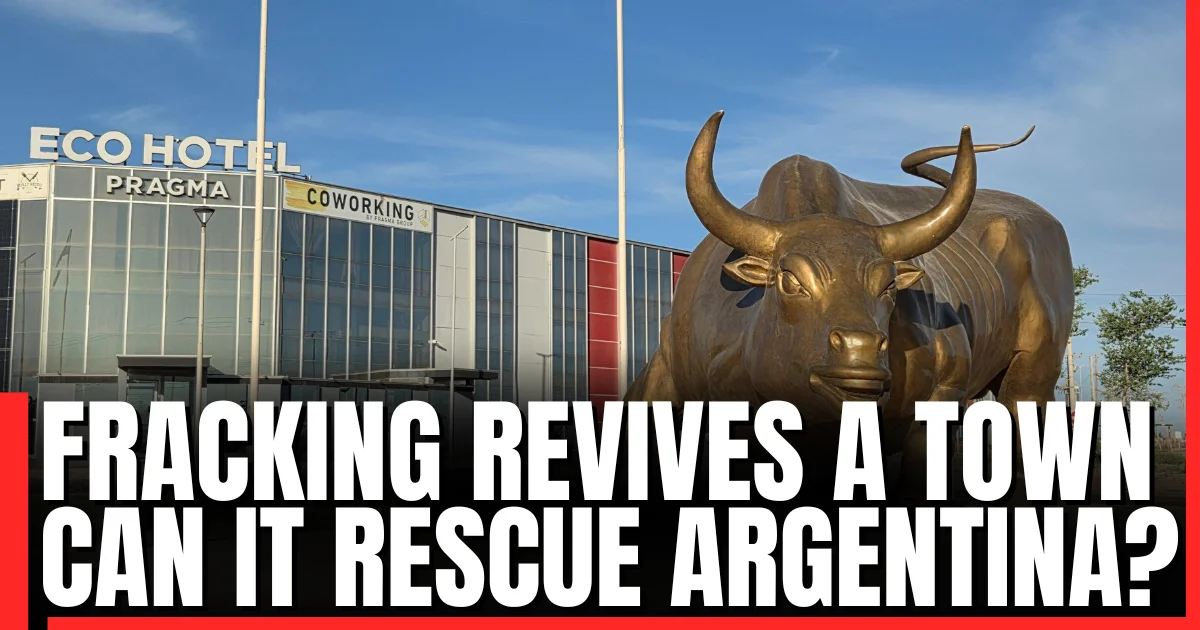Fracking has revolutionized a small Argentine town with new wealth and jobs. But can the oil boom rescue the entire struggling economy? Full analysis inside.
Table of Contents
Fracking Has Completely Transformed an Argentine Town But Can It Rescue the Entire Nation?
A dusty Argentine town has experienced a stunning metamorphosis thanks to fracking technology. Where poverty once dominated, prosperity now flows alongside oil and gas. But as this remote community celebrates its transformation, a bigger question looms: can fracking rescue Argentina’s perpetually struggling national economy?
A Town Reborn Through Fracking
The transformation appears almost miraculous. A small Patagonian town that once offered residents little hope now buzzes with economic activity and opportunity.
New housing developments rise where empty desert stretched before. Restaurants and shops serve workers earning salaries previously unimaginable in this region. Schools report increased enrollment as families relocate seeking opportunity.
This remarkable change stems entirely from one development: massive fracking operations tapping into the Vaca Muerta shale formation beneath the Argentine desert.
Understanding Vaca Muerta
Vaca Muerta represents one of the world’s largest shale oil and gas deposits. Its potential has attracted global attention and investment.
Vaca Muerta key statistics:
| Metric | Detail |
|---|---|
| Size | Approximately 30,000 square kilometers |
| Location | Patagonia region, Neuquén Province |
| Reserves | Estimated 16 billion barrels of oil equivalent |
| Global ranking | Second-largest shale gas, fourth-largest shale oil |
| Active wells | Thousands currently operating |
The formation’s name translates to “Dead Cow” in English, referencing the harsh landscape above these underground riches. That barren surface now hosts intensive industrial activity.
American energy companies recognized Vaca Muerta’s potential early. Their expertise and investment helped unlock resources Argentine firms couldn’t access alone.
Life Before and After Fracking
Residents describe two completely different realities separated by fracking’s arrival. The contrast could hardly be more dramatic.
Before fracking:
- Limited employment opportunities beyond basic agriculture
- Young people leaving for cities seeking work
- Struggling local businesses with few customers
- Minimal public services and infrastructure
- Pervasive economic hopelessness
After fracking:
- Abundant high-paying jobs across skill levels
- Workers relocating from across Argentina
- Booming service sector supporting oil workers
- Improved roads, schools, and public services
- Genuine optimism about future prospects
This transformation happened within just a few years. The speed of change has amazed longtime residents who remember harder times.
The Economic Numbers Tell the Story
Statistical evidence confirms what residents experience daily. Fracking has generated remarkable local economic growth.
Economic indicators include:
- Unemployment dropping from double digits to near zero
- Average wages multiplying several times over
- Property values increasing dramatically
- Local tax revenues funding improved services
- Business creation rates surging
Workers report earning salaries that would be impressive even in Buenos Aires. In this remote region, such income transforms family circumstances completely.
The multiplier effect spreads benefits beyond direct oil employment. Every fracking job supports additional positions in housing, food service, retail, and transportation.
American Investment Drives Development
US energy companies have played crucial roles in Vaca Muerta’s development. Their technology, expertise, and capital proved essential.
American involvement includes:
| Company Type | Contribution |
|---|---|
| Major oil companies | Direct investment in extraction operations |
| Service providers | Technical expertise and equipment |
| Financial institutions | Capital for infrastructure development |
| Engineering firms | Design and construction support |
| Training organizations | Workforce development programs |
This American connection gives US observers particular interest in Vaca Muerta’s progress. Success or failure affects American companies and investors directly.
The partnership has transferred fracking expertise developed in Texas and North Dakota to the Argentine desert. Similar techniques now extract similar resources.
But Can Fracking Save Argentina?
Here’s where optimism meets sobering reality. One booming region cannot single-handedly rescue a nation facing profound economic challenges.
Argentina’s broader economic problems:
- Chronic inflation rates among world’s highest
- Currency instability undermining business confidence
- Massive government debt limiting policy options
- Political uncertainty affecting investment decisions
- Poverty affecting significant population percentages
Vaca Muerta generates billions in economic activity. However, Argentina’s economy measures in hundreds of billions. The fracking boom represents important growth but not comprehensive solution.
Energy exports help but cannot replace diversified economic development. Argentina needs multiple sectors thriving, not just petroleum extraction.
The Scale Challenge Explained
Understanding why fracking alone cannot save Argentina requires examining relative scales. The numbers illuminate the challenge.
Comparative context:
- Vaca Muerta production: Significant and growing
- Argentine GDP: Over $600 billion annually
- Energy sector share: Important but minority percentage
- Employment generated: Tens of thousands directly
- National workforce: Over 20 million people
Even dramatically expanded fracking operations cannot employ most Argentines or generate most national income. The math simply doesn’t support such expectations.
This reality doesn’t diminish fracking’s importance. It simply contextualizes what one industry can realistically accomplish.
Environmental Concerns Persist
Economic benefits haven’t silenced environmental critics. Fracking in Argentina faces opposition similar to debates in the United States.
Environmental issues raised:
- Water usage — Fracking requires substantial water in arid regions
- Seismic concerns — Questions about induced earthquake risks
- Chemical exposure — Worries about groundwater contamination
- Land disruption — Surface impacts on ecosystems
- Climate implications — Fossil fuel extraction amid climate crisis
Argentine environmental groups have organized against fracking expansion. They argue short-term economic gains create long-term ecological costs.
Industry supporters counter that modern fracking techniques minimize risks. They point to economic benefits lifting communities from poverty.
Political Dimensions Complicate Everything
Argentina’s volatile political landscape affects fracking’s future. Different governments bring different approaches to energy development.
Political factors include:
- Shifting policies between administrations
- Debates over foreign investment terms
- Nationalization threats affecting investor confidence
- Regulatory uncertainty complicating long-term planning
- Currency controls impacting profit repatriation
American companies have experienced Argentina’s political unpredictability before. Some remain cautious despite Vaca Muerta’s geological promise.
Stable, predictable policies would accelerate development. Whether Argentine politics can provide such consistency remains questionable.
Lessons for American Observers
Argentina’s fracking experience offers insights relevant to American energy discussions. Similar dynamics play out in different contexts.
Applicable lessons include:
- Local communities can benefit dramatically from energy development
- Regional booms don’t automatically solve national problems
- Environmental tradeoffs accompany economic benefits
- Political stability affects investment decisions
- Technology transfer creates international connections
American communities experiencing their own energy booms recognize parallels. The promises and challenges translate across borders.
What Comes Next for Argentina
Vaca Muerta’s development continues despite challenges. Production increases annually as more wells come online.
Future scenarios include:
| Scenario | Likelihood |
|---|---|
| Continued gradual growth | Most probable near-term |
| Dramatic acceleration | Possible with policy improvements |
| Stagnation | Risk if political instability worsens |
| Major expansion | Requires sustained investment commitment |
Argentina’s government recognizes energy’s importance to national finances. Export revenues from oil and gas help manage chronic foreign currency shortages.
Whether fracking reaches its full potential depends on factors beyond geology. Politics, economics, and policy will ultimately determine outcomes.
FAQs
What is Vaca Muerta and why is it important?
Vaca Muerta is a massive shale oil and gas formation located in Argentina’s Patagonia region. It ranks among the world’s largest such deposits, containing an estimated 16 billion barrels of oil equivalent. Its development has transformed local communities and boosted Argentine energy production significantly.
How has fracking changed the local Argentine town?
Fracking has brought unprecedented prosperity to previously impoverished communities near Vaca Muerta. Residents now enjoy high-paying jobs, improved infrastructure, better schools, and thriving local businesses. The transformation occurred rapidly once major extraction operations began.
Are American companies involved in Argentine fracking?
Yes, American oil companies, service providers, and investors have played crucial roles in Vaca Muerta’s development. US expertise in fracking technology transferred from American shale fields has proven essential for unlocking Argentina’s resources efficiently.
Can fracking solve Argentina’s economic problems?
While fracking provides significant economic benefits, it cannot single-handedly rescue Argentina’s troubled economy. The energy sector represents an important but minority portion of national economic activity. Argentina needs broader reforms and diversified growth beyond petroleum extraction.
What environmental concerns exist about Argentine fracking?
Environmental critics raise concerns about water usage in arid regions, potential groundwater contamination, seismic activity risks, ecosystem disruption, and climate change implications. These debates mirror similar discussions about fracking in the United States and other countries.
Conclusion
Fracking has undeniably transformed a small Argentine town from poverty to prosperity. The Vaca Muerta shale formation has delivered on promises of jobs, income, and opportunity for local residents.
However, expecting fracking to rescue Argentina’s entire economy sets unrealistic expectations. The nation’s challenges require broader solutions than any single industry can provide.
Vaca Muerta represents important progress but not a comprehensive answer to Argentina’s complex economic struggles.
Follow our international business coverage for more global economic stories. Share your thoughts on Argentina’s energy future in the comments below.

